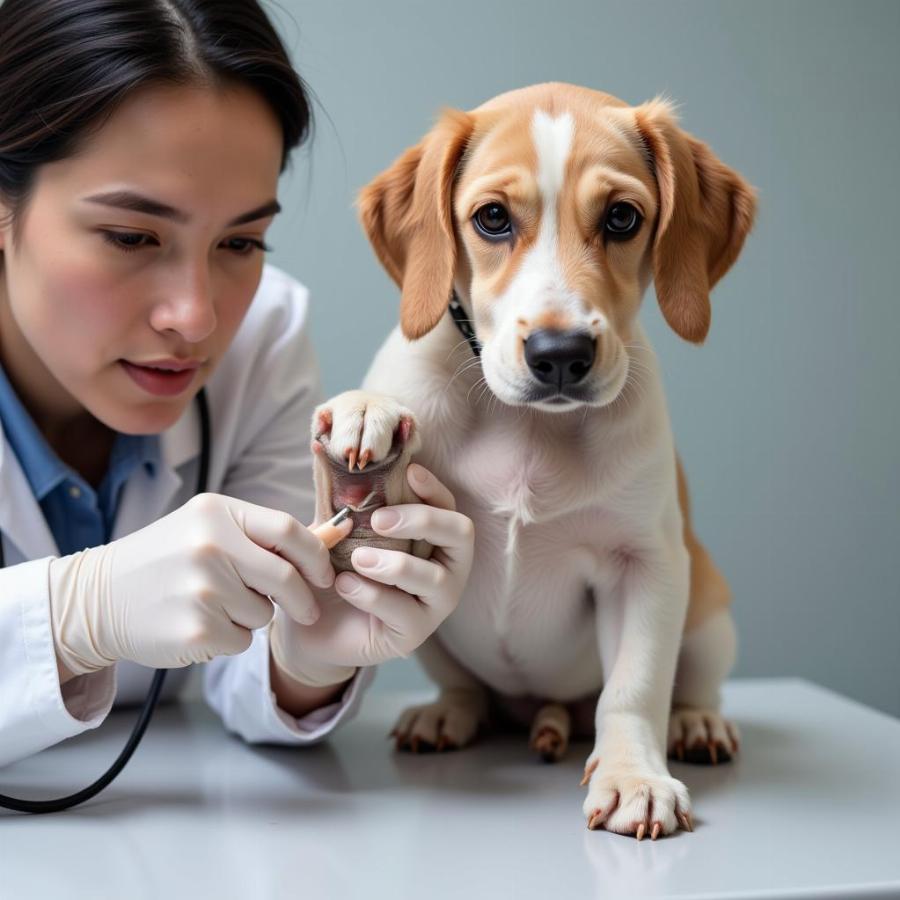Excessive paw licking in dogs can be a frustrating mystery for owners. Is it a simple habit, or is something more serious going on? Understanding why your dog licks their paws is crucial for addressing the underlying issue and ensuring your furry friend’s comfort and well-being. This article will delve into the various reasons behind paw licking, ranging from allergies to anxiety, and offer guidance on how to help your dog.
Common Reasons for Paw Licking
Several factors can contribute to a dog’s paw licking habit. Identifying the root cause is the first step toward finding a solution.
Allergies
Just like humans, dogs can suffer from allergies, which can manifest as itchy skin and paws. Environmental allergens like pollen, dust mites, and mold can irritate their paws, leading to excessive licking. Food allergies can also trigger this behavior. Common culprits include beef, chicken, dairy, and wheat.
Parasites
Fleas, ticks, and mites can infest a dog’s paws, causing intense itching and irritation. Even if you don’t see any visible parasites, microscopic mites can be the culprit.
Injuries
A cut, thorn, or foreign object lodged in your dog’s paw can cause discomfort and lead to licking. Sometimes, the injury might not be immediately visible, so a thorough examination is essential.
Dry Skin
Dry, cracked paws can be uncomfortable for dogs, prompting them to lick for relief. This is especially common during dry winter months or in areas with low humidity.
Boredom and Anxiety
Licking can be a self-soothing behavior for dogs experiencing boredom or anxiety. Separation anxiety, changes in routine, or loud noises can trigger this behavior.
Diagnosing the Cause of Paw Licking
If your dog is excessively licking their paws, it’s important to consult a veterinarian. They can perform a thorough examination to determine the underlying cause and recommend appropriate treatment.
Veterinary Examination
Your vet will likely ask about your dog’s history, including any recent changes in diet, environment, or behavior. They may also perform skin scrapings or blood tests to rule out allergies or parasites.
 Veterinarian examining a dog's paw
Veterinarian examining a dog's paw
Treatment and Management
The treatment for paw licking will depend on the underlying cause.
Addressing Allergies
If allergies are the culprit, your vet may prescribe antihistamines, medicated shampoos, or a special diet. Identifying and avoiding the allergen is also crucial.
Parasite Control
Regular flea and tick prevention is essential for all dogs. If mites are suspected, your vet may recommend a specific treatment.
Wound Care
Clean and disinfect any injuries on your dog’s paw. Your vet may recommend antibiotics or pain medication if necessary.
Moisturizing Dry Paws
Use a dog-safe paw balm to moisturize dry, cracked paws. Avoid human lotions, as they can contain ingredients that are toxic to dogs.
Behavioral Modification
For boredom or anxiety-related licking, provide your dog with plenty of mental and physical stimulation. Puzzle toys, regular exercise, and training can help redirect their energy and reduce anxiety.
When is Paw Licking a Serious Issue?
While occasional paw licking is normal, persistent and excessive licking can indicate a serious underlying problem. If your dog’s paw licking is accompanied by redness, swelling, bleeding, or a foul odor, seek immediate veterinary attention.
Is Your Dog Licking Just One Paw?
If your dog is focusing on just one paw, it’s more likely due to a localized issue like an injury or a foreign object. dog licks paw Carefully inspect the paw for any visible signs of a problem.
Could It Be a Yeast Infection?
Yeast infections can also cause itchy paws. These infections often thrive in moist environments between the paw pads. why does dog lick paws If you suspect a yeast infection, consult your veterinarian for diagnosis and treatment.
Understanding Dog Paw Anatomy
Understanding the anatomy of dog’s paw can help you better identify potential problems. The paw is a complex structure with sensitive pads and delicate skin.
What if My Dog is Licking Other Areas?
Sometimes, paw licking can be accompanied by licking other areas, such as the genitals. While some licking is normal, excessive licking can indicate a problem. dog licks pusy Consult your vet if you’re concerned.
Conclusion
Excessive paw licking in dogs can stem from various causes, ranging from simple allergies to more complex behavioral issues. By understanding the potential reasons behind this behavior and seeking professional guidance when necessary, you can help your furry friend find relief and maintain healthy, happy paws. Don’t hesitate to consult your veterinarian if you’re concerned about your dog’s paw licking. Early intervention is key to addressing the underlying issue and preventing further complications.
FAQ
- Is it normal for dogs to lick their paws occasionally? Yes, occasional paw licking is a normal grooming behavior.
- When should I be concerned about paw licking? If the licking is excessive, persistent, or accompanied by other symptoms like redness or swelling, consult your vet.
- Can food allergies cause paw licking? Yes, food allergies can manifest as itchy skin and paws.
- How can I prevent my dog from licking their paws? Addressing the underlying cause is the best way to prevent paw licking.
- What are some home remedies for dry paws? Applying a dog-safe paw balm can help moisturize dry paws.
- How can I tell if my dog has a paw injury? Look for signs of limping, swelling, bleeding, or sensitivity to touch.
- Can anxiety cause paw licking? Yes, anxiety and boredom can lead to excessive licking as a self-soothing behavior.
Further Reading
- Dog Paw Care Tips
- Understanding Dog Allergies
- Dealing with Dog Anxiety
Beaut Dogs is your trusted source for all things related to dog care. We offer expert advice and resources to help you provide the best possible care for your beloved canine companion. For personalized guidance and answers to your specific questions, contact us at [email protected]. Beaut Dogs is committed to helping you navigate the joys and challenges of dog ownership. Visit us at https://beautdogs.com.